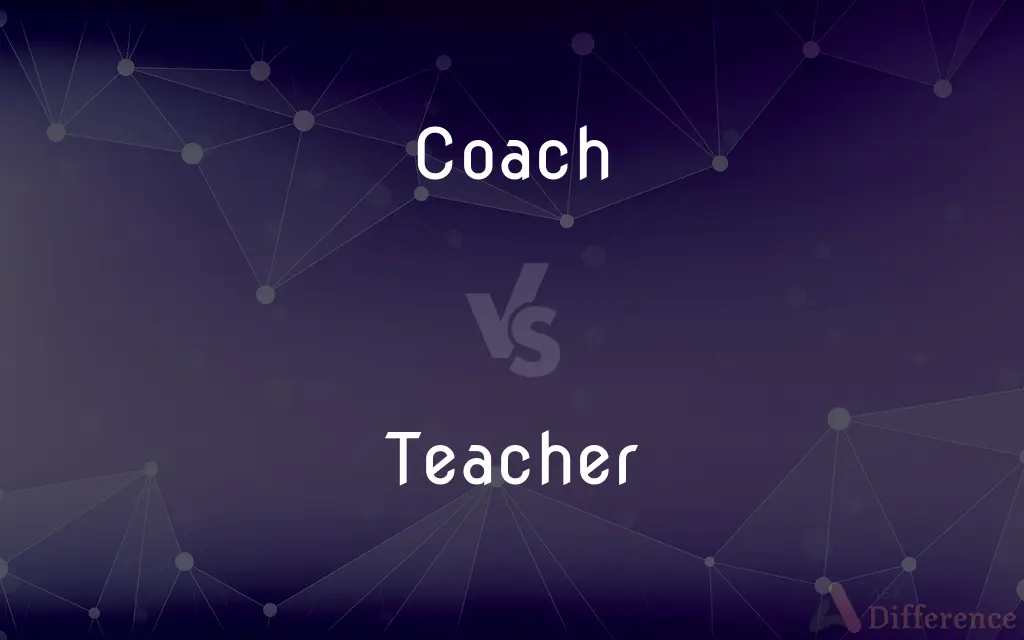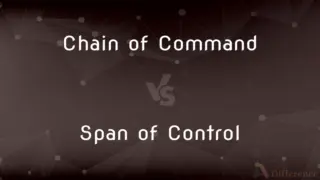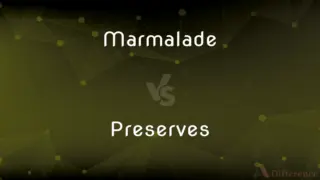Coach vs. Teacher — What's the Difference?
Edited by Tayyaba Rehman — By Urooj Arif — Published on March 2, 2024
A coach focuses on enhancing specific skills or behaviors through practice and feedback, in sports or professional contexts. A teacher imparts knowledge and understanding in academic or skill-based areas, emphasizing theoretical and practical learning.

Difference Between Coach and Teacher
Table of Contents
ADVERTISEMENT
Key Differences
Coaches are typically associated with sports, where they work to improve an individual's or team's performance through targeted practice, strategies, and motivation. They often focus on physical skills, teamwork, and mental resilience. Teachers, on the other hand, operate within educational settings, aiming to broaden students' knowledge base and critical thinking skills across various subjects, from math and science to humanities.
A coach's approach is highly personalized, adapting to the individual needs and goals of their athletes or clients. This customization allows coaches to address specific strengths and weaknesses, fostering personal and professional growth. Teachers, while also attentive to individual needs, must adhere to a curriculum that dictates the scope and sequence of learning, often striving to meet standardized educational benchmarks.
In terms of methodology, coaches often utilize hands-on practice, real-time feedback, and performance analysis as their primary tools for improvement. This practical, action-oriented approach is designed to produce observable outcomes, such as enhanced performance or skill mastery. Teachers rely on a broader array of instructional strategies, including lectures, discussions, projects, and assessments, to cultivate a deep understanding of the subject matter and develop intellectual skills.
The relationship dynamics between coaches and their athletes or clients can be more informal and mentorship-oriented, with a strong emphasis on motivation, discipline, and personal development. In contrast, teachers may maintain a more formal relationship with their students, focusing on authority, guidance, and academic achievement, though this can vary widely with teaching style and educational context.
The success of a coach is often measured by the tangible results achieved by their athletes or teams, such as wins in competitions or improvements in performance metrics. For teachers, success is evaluated through academic achievements, such as grades, test scores, and the overall intellectual growth of their students.
ADVERTISEMENT
Comparison Chart
Focus
Enhancing specific skills or behaviors
Imparting knowledge and understanding
Setting
Sports, personal development
Academic institutions
Methodology
Practice, feedback, performance analysis
Lectures, discussions, projects, assessments
Relationship
Informal, mentorship-oriented
Formal, authoritative
Success Metrics
Wins, performance improvements
Grades, test scores, intellectual growth
Compare with Definitions
Coach
A coach aims to improve performance through practice and feedback.
A soccer coach develops players' skills through drills and game analysis.
Teacher
A teacher provides educational instruction in various subjects.
A math teacher covers topics from algebra to calculus.
Coach
Specializes in physical and mental training.
A fitness coach designs personalized workouts to meet health goals.
Teacher
Emphasizes theoretical knowledge and practical skills.
A science teacher conducts experiments to demonstrate principles.
Coach
Offers hands-on, targeted guidance.
A voice coach provides immediate feedback on pitch and tone during singing practice.
Teacher
Uses a curriculum to guide learning.
An English teacher follows a syllabus that includes literature, writing, and grammar.
Coach
Focuses on achieving specific, measurable outcomes.
A business coach helps entrepreneurs increase their company's revenue.
Teacher
Evaluates students' progress through assessments.
A history teacher assigns essays and exams to measure understanding.
Coach
Cultivates a motivational and supportive environment.
A life coach encourages clients to pursue personal and professional goals.
Teacher
Prepares students for academic and life challenges.
A teacher educates students about critical thinking and problem-solving.
Coach
A bus, especially one designed for long-distance passenger service.
Teacher
One who teaches, especially one hired to teach.
Coach
(Sports) A person who trains or directs athletes or athletic teams.
Teacher
A person who teaches, especially one employed in a school.
Coach
To train or tutor or to act as a trainer or tutor.
Teacher
One who teaches or instructs; one whose business or occupation is to instruct others; an instructor; a tutor.
Coach
A trainer or instructor.
Teacher
One who instructs others in religion; a preacher; a minister of the gospel; sometimes, one who preaches without regular ordination.
The teachers in all the churches assembled.
Coach
A special tutor who assists in preparing a student for examination.
Wareham was studying for India with a Wancester coach.
Coach
(sports) someone in charge of training an athlete or a team
Coach
A person who gives private instruction (as in singing or acting)
Common Curiosities
Can a teacher also be a coach?
Yes, many teachers also take on coaching roles, especially in schools with sports teams.
Is the role of a coach limited to sports?
No, coaching can apply to various fields, including personal development and professional skills.
What's the importance of feedback in coaching?
Feedback is crucial in coaching for immediate improvement and adjusting strategies to enhance performance.
How do teachers assess student learning?
Through assignments, tests, projects, and exams that measure understanding and application of the subject matter.
What skills are essential for a teacher?
Patience, knowledge of the subject, instructional skills, and the ability to engage and motivate students.
How do the methodologies of coaches and teachers differ?
Coaches use practice and feedback for skill enhancement, while teachers employ a wider range of instructional strategies for knowledge dissemination.
Can a coach influence personal development?
Yes, coaches often play significant roles in personal growth, discipline, and motivation.
Do coaches and teachers have different goals?
Both aim for improvement and growth, but coaches focus on specific skills, and teachers aim for academic and intellectual development.
Why is motivation important in coaching?
Motivation drives individuals to improve, overcome challenges, and achieve their goals, a key aspect of coaching.
What differentiates a coach from a teacher?
A coach focuses on specific skill improvement, while a teacher imparts broad academic knowledge.
What's the role of a curriculum in teaching?
It guides the educational content, ensuring a structured and comprehensive approach to learning.
Can teachers and coaches impact an individual's life trajectory?
Absolutely, both play crucial roles in shaping skills, knowledge, attitudes, and overall personal and professional development.
Is a coaching relationship more personal than a teacher-student relationship?
It can be, as coaching often involves one-on-one sessions focusing on personal goals and challenges.
How does a coach's feedback differ from a teacher's?
Coach feedback is often immediate and specific to actions, while teacher feedback may focus more on academic performance and understanding.
How do coaches and teachers measure success?
Coaches look at tangible improvements in skills or achievements, while teachers assess academic progress and intellectual growth.
Share Your Discovery

Previous Comparison
Chain of Command vs. Span of Control
Next Comparison
Marmalade vs. PreservesAuthor Spotlight
Written by
Urooj ArifUrooj is a skilled content writer at Ask Difference, known for her exceptional ability to simplify complex topics into engaging and informative content. With a passion for research and a flair for clear, concise writing, she consistently delivers articles that resonate with our diverse audience.
Edited by
Tayyaba RehmanTayyaba Rehman is a distinguished writer, currently serving as a primary contributor to askdifference.com. As a researcher in semantics and etymology, Tayyaba's passion for the complexity of languages and their distinctions has found a perfect home on the platform. Tayyaba delves into the intricacies of language, distinguishing between commonly confused words and phrases, thereby providing clarity for readers worldwide.
















































